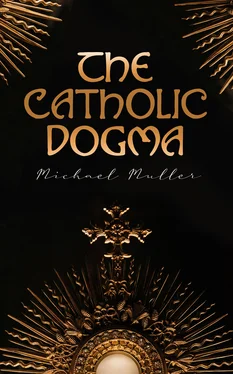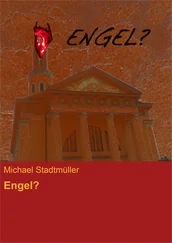Michael Müller - The Catholic Dogma
Здесь есть возможность читать онлайн «Michael Müller - The Catholic Dogma» — ознакомительный отрывок электронной книги совершенно бесплатно, а после прочтения отрывка купить полную версию. В некоторых случаях можно слушать аудио, скачать через торрент в формате fb2 и присутствует краткое содержание. Жанр: unrecognised, на английском языке. Описание произведения, (предисловие) а так же отзывы посетителей доступны на портале библиотеки ЛибКат.
- Название:The Catholic Dogma
- Автор:
- Жанр:
- Год:неизвестен
- ISBN:нет данных
- Рейтинг книги:4 / 5. Голосов: 1
-
Избранное:Добавить в избранное
- Отзывы:
-
Ваша оценка:
- 80
- 1
- 2
- 3
- 4
- 5
The Catholic Dogma: краткое содержание, описание и аннотация
Предлагаем к чтению аннотацию, описание, краткое содержание или предисловие (зависит от того, что написал сам автор книги «The Catholic Dogma»). Если вы не нашли необходимую информацию о книге — напишите в комментариях, мы постараемся отыскать её.
The Catholic Dogma — читать онлайн ознакомительный отрывок
Ниже представлен текст книги, разбитый по страницам. Система сохранения места последней прочитанной страницы, позволяет с удобством читать онлайн бесплатно книгу «The Catholic Dogma», без необходимости каждый раз заново искать на чём Вы остановились. Поставьте закладку, и сможете в любой момент перейти на страницу, на которой закончили чтение.
Интервал:
Закладка:
Christ, then, permits the storms of heresies to beat upon his Church, in order to bring forth into clearer light his divine doctrine, and to remove dangerous elements from his Mystic Body - the Roman Catholic Church.
At the beginning of the sixteenth century, with the exception of the Greek schismatics, a few Lollards in England, some Waldenses in Piedmont, scattered Albigenses or Manicheans, and a few followers of Huss and Zisca among the Bohemians, all Europe was Roman Catholic. England, Scotland, Ireland, Spain, Portugal, France, Italy, Germany, Switzerland, Hungary, Poland, Holland, Denmark, Norway, and Sweden, - every civilized nation was in the unity of the Catholic faith. Many of these nations were at the height of their power and prosperity. Portugal was pushing her discoveries beyond the Cape of Good Hope, and forming Catholic settlements in the East Indies. Christopher Columbus, a Roman Catholic, had discovered America, under the patronage of the Catholic Isabella of Spain. England was in a state of great prosperity. Her two Catholic Universities of Oxford and Cambridge contained, at one time, more than fifty thousand students. The country was covered with noble churches, abbeys, and monasteries, and with hospitals where the poor were fed, clothed and instructed.
However, the progress of civilization tended to foster a spirit of pride, and encourage the lust of novelties. The prosperity of the Church led to luxury, and in many cases to a relaxation of discipline. There were, as there always have been, in every period of the Church, the days of the apostles not excepted, bad men in the Church.
The wheat and tares grow together until the harvest. The net of the Church encloses good and bad. The writings of Wickliffe, Huss, and their followers, had unsettled the minds of many. Princes were restive under the check held by the Church upon their rapacity and lusts. Henry VIII., for example, wanted to divorce a wife to whom he had been married twenty years, that he might marry a young and pretty one. He could not do this, so long as he acknowledged the spiritual supremacy of the Pope. Philip, Landgrave of Hesse, wanted two wives. No Pope would give him a dispensation to marry and live with two women at once. Then there were multitudes of wicked and avaricious nobles, who wanted but an excuse to plunder the churches, abbeys, and monasteries, whose property was held in trust for the education of the people and the care of the poor, aged, and sick, all over Europe. Then there were priests and monks eager to embrace a relaxed discipline, and many people who, incited by the cry of liberty, were ready to rush into license, and make war upon every principle of religion and social order, as soon as circumstances would favor the outbreak of this rebel spirit in individuals and masses. Now, when God, says St. Gregory, sees in the Church many revelling in their vices, and, as St. Paul observes, believing in God, confessing the truth of his mysteries, but belying their faith by their works, he punishes them by permitting that after having lost grace, they also lose the holy knowledge which they had of his mysteries, and that, without any other persecution than that of their vices, they deny the faith. It is of these David speaks, when be says: "Destroy Jerusalem to its foundations;" (Ps. cxxxvi. 7.) leave not a stone upon stone. When the wicked spirits have ruined in a soul the edifice of virtue, they sap its foundation, which is faith. St. Cyprian, therefore, said: "Let no one think that virtuous men and good Christians ever leave the bosom of the Church; it is not the wheat that the wind lifts, but the chaff; trees deeply rooted are not blown down by the breeze, but those which have no roots. It is rotten fruits that fall off the trees, not sound ones; bad Catholics become heretics, as sickness is engendered by bad humors. At first, faith languishes in them, because of their vices; then it becomes sick; next it dies, because, since sin is essentially a blindness of spirit, the more a man sins, the more he is blinded; his faith grows weaker and weaker; the light of this divine torch decreases, and soon the least wind of temptation or doubt suffices to extinguish it." Witness the great defection from faith in the sixteenth century, when God permitted heresies to arise, in order to exercise his justice against those who were ready to abandon the truth, and his mercy toward those who remained attached to it; to prove, by trials, those who were firm in the faith, and to separate them from those who1oved error; to exercise the patience and charity of the Church, and to sanctify, the elect; to give occasion for the illustration of religious truth and the holy Scripture; to make pastors more vigilant, and value more the sacred deposit of faith; in fine, to render the authority of tradition more clear and incontestable. Heresy arose in all its strength; Martin Luther was its ringleader and its spokesman.
Martin Luther, an Augustinian friar, a bold man, and a vehement declaimer, having imbibed erroneous sentiments from the heretical writings of John Huss of Bohemia, took occasion, from the publication of indulgences promulgated by Pope Leo X., to break with the Catholic Church, and to propagate his new errors, in 1517, at Wittenberg, in Saxony. He first inveighed against the abuse of indulgences; then he called in question their efficacy; and at last totally rejected them. He declaimed against the supremacy of the See of Rome, and condemned the whole Church, pretending that Christ had abandoned it, and that it wanted reforming, as well in faith as discipline. Thus this new evangelist commenced that fatal defection from the ancient faith, which was styled "Reformation." The new doctrines, being calculated to gratify the vicious inclinations of the human heart, spread with the rapidity of an inundation. Frederick, Elector of Saxony, John Frederick, his successor, and Philip, Landgrave of Hesse, became Luther's disciples. Gustavus Ericus, King of Sweden, and Christian III., King of Denmark, also declared in favor of Lutheranism. It secured a footing in Hungary. Poland, after tasting a great variety of doctrines, left to every individual the liberty of choosing for himself. Munzer, a disciple of Luther, set up for doctor himself, and, with Nicholas Stark, gave birth to the sect of Anabaptists, which was propagated in Suabia, and other provinces in Germany, in the Low Countries. Calvin, a man of bold, obstinate spirit, and indefatigable in his labors, in imitation of Luther, turned reformer also. He contrived to have his new tenets received at Geneva, in 1541. After his death, Beza preached the same doctrine. It insinuated itself into some parts of Germany, Hungary, Bohemia, and became the religion of Holland. It was imported by John Knox, an apostate priest, into Scotland, where, under the name of Presbyterianism, it took deep root, and spread over the kingdom. But among the deluded nations, none drank more deeply of the cup of error than England. For many centuries this country had been conspicuous in the Christian world for the orthodoxy of its belief, as also for the number of its saints. But by a misfortune never to be sufficiently lamented, and by an unfathomable judgment from above, its Church shared a fate which seemed the least to threaten it. The lust and avarice of one despotic sovereign threw down the fair edifice, and tore it off the rock on which it had hitherto stood. Henry VIII., at first a valiant asserter of the Catholic faith against Luther, giving way to the violent passions which he had not sufficient courage to curb, renounced the supreme jurisdiction which the Pope had always held in the Church, presumed to arrogate to himself that power in his own dominions, and thus gave a deadly blow to religion. He then forced his subjects into the same fatal defection. Once introduced, it soon overspread the land. Being, from its nature, limited by no fixed principle, it has since taken a hundred different shapes, under different names, such as: the Calvinists, Arminians, Antinomians, Independents, Kilhamites, Glassites, Haldanites, Bereans, Swedenborgians, New-Jerusalemites, Orthodox Quakers, Hicksites, Shakers, Panters, Seekers, Jumpers, Reformed Methodists, German Methodists, Albright Methodists, Episcopal Methodists, Wesleyan Methodists, Methodists North, Methodists South, Protestant Methodists, Episcopalians, High Church Episcopalians, Low Church Episcopaleans, Rirualists, Puseyites, Dutch Reformed, Dutch non-Reformed, Christian Israelites, Baptists, Particular Baptists, Seventh-day Baptists, Hardshell Baptists, Soft-shell Baptists, Forty Gallon Baptists, Sixty Gallon Baptists, African Baptists, Free-will Baptists, Church of God Baptists, Regular Baptists, Anti-mission Baptists, Six Principle Baptists, River Brethren, Winebremarians, Mennonites, Second Adventists, Millerites, Christian Baptists, Universalists, Orthodox Congregationalists, Campbellites, Presbyterians, Old School Presbyterians and New School Presbyterians, Cumberland Presbyterians, United Presbyterians, The Only True Church of Christ, 573 Bowery, N. Y., up stairs, 5th story, Latter-day Saints, Restorationists, Schwenfelders, Spiritualists, Mormons, Christian Perfectionists, etc., etc., etc. All these sects are called Protestants because they all unite in protesting against their mother, the Roman Catholic Church.
Читать дальшеИнтервал:
Закладка:
Похожие книги на «The Catholic Dogma»
Представляем Вашему вниманию похожие книги на «The Catholic Dogma» списком для выбора. Мы отобрали схожую по названию и смыслу литературу в надежде предоставить читателям больше вариантов отыскать новые, интересные, ещё непрочитанные произведения.
Обсуждение, отзывы о книге «The Catholic Dogma» и просто собственные мнения читателей. Оставьте ваши комментарии, напишите, что Вы думаете о произведении, его смысле или главных героях. Укажите что конкретно понравилось, а что нет, и почему Вы так считаете.












